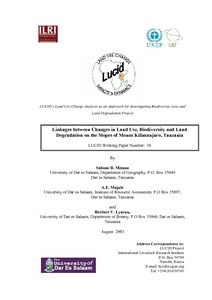Data sets, indicators and methods to assess land degradation in drylands
This report summarizes the findings of the e-mail conference that took place from 9 October to 4 November 2002 and which was organized by the Land Degradation Assessment in Drylands project (LADA). The report contains exchanges of views on data sets and methods that may be used to assess land degradation and a discussion on the biophysical, socio-economic and institutional indicators that explain the root causes, driving forces, status, impact and reponses to land degradation at various scales.
AHI program brief
The African Highlands Initiative works to enhance livelihoods and reverse natural resource degradation
through the development of innovative methods,practices,policies and approaches.
The economics of land degradation and technological change: a case study in Vietnam
This paper explores the economics of land degradation in the rice-shrimp system inthe Mekong Delta of Vietnam. A bioeconomic NPV model was developed toevaluate and compare the long-term benefits of alternative production choices andfarm technologies. There is an alternative rice-shrimp technology emerging inVietnam that does not have the same land degrading impacts as the 'traditional'system, however the high capital outlay and risk associated with such technologypresents its own problems.
The conflict dimension of environmental degradation and the case of Lesotho
This article describes the effects of conflict on the environment and environmental management, focussing on Lesotho, a country historically affected by environmental degradation problems such as devegetation, soil erosion, and desertification.
Nepal: breaking new ground: leasehold forestry in Nepal: hills leasehold forestry and forage development project
This document presents the results of an evaluation of an IFAD project aimed at preventing land degradation in Nepal. The project is based on leasehold forestry, an innovative approach introduced by IFAD in the early 1990s. It works by providing forty-year leases to groups of households and giving them user rights over plots of degraded forest land.
New stakeholders and the promotion of agro-silvo-pastoral activities in southern Burkina Faso: false start or inexperience?
This paper explores and evaluates the impact of a new form of large-scale agriculture which is becoming an increasing phenomenon in southern Burkina Faso. With severe ecological deterioration and food deficits, small-scale agriculture is usually seen as the key to economic prosperity, social solidarity and sustainable management of local resources. However, a set of new stakeholders, comprising politicians, entrepreneurs and employees, is promoting large-scale agribusiness as a relevant and viable alternative for agricultural development in the country.
Balancing agricultural development and deforestation in the Brazilian Amazon
This report identifies the links among economic growth, poverty alleviation, and natural resource degradation in Brazil. It examines the effects of (1) a major devaluation of the Brazilian real (R$); (2) improvements of infrastructure in the Amazon to link it with the rest of Brazil and bordering countries; (3) modification of land tenure regimes in the Amazon agricultural frontier; (4) adoption of technological change in agriculture both inside and outside the Amazon; and (5) fiscal mechanisms to reduce deforestation." -- from Author's Abstract
La Agenda Inconslusa: perspectivas para superar el hambre, la pobreza y la degradación ambiental
En las últimas décadas, el mundo ha hecho un progreso impresionante para mejorar la calidad de vida de millones de personas; sin embargo, todavía sigue inconclusa la tarea de garantizar la seguridad alimentaria a los más pobres de una manera sostenible. La explosión demográfica, la expansión urbana, la desnutrición y la mala salud persistentes, las tierras agrícolas degradadas y el agua escasa, la carencia de poder de las mujeres, la globalización acelerada y la rápida aparición de nuevas tecnologías - todos estos y muchos otros factores están influenciando este esfuerzo continuo.
Ending hunger in Africa
"In contrast to popular predictions of Africa’s worsening economic decline, recent research supports an alternative and more positive vision of Africa’s future. New political commitment and African ownership of the development agenda, combined with a renewed focus on and investments in smallholder-led agriculture, have the potential to halt or reverse the current downward spiral of hunger, poverty, environmental degradation, disease, and civil strife.









